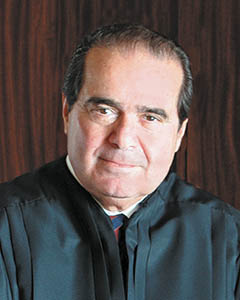
America’s Jewish community lost a good friend with the passing of Supreme Court Justice Antonin Scalia, who died of a heart attack last weekend at the age of 79.
Scalia, who was born in Trenton, told highly regarded attorney Nathan Lewin that when there was no Jewish justice on the Supreme Court, he considered himself the Jewish justice, according to a piece written this week by Lewin for JTA.
Lewin was referring to the time between Abe Fortas’s 1969 resignation and Ruth Bader Ginsburg’s appointment to the Court by then-President Bill Clinton in 1993.
It was Ginsburg, who while disagreeing with Scalia on many Supreme Court decisions, turned out to be one of his closest friends.
“I love him, but sometimes I’d like to strangle him,” said Ginsburg, who found opera to be the common and close bond between herself and Scalia.
He was the first Italian American appointed to the Court, in this case by President Ronald Reagan in 1986.
Scalia never held back in his decisions, whether popular or not. When the court legalized same-sex marriage in June 2015 by a 5-4 vote, Scalia, who was in the minority, said he would “hide my head in a bag” if his name were connected with that decision. He said that the opinion was “couched in a style that is as pretentious as its content is egotistic.”
Many legal experts say that Scalia’s most important decision came in 2008 when he authored the majority opinion, 5-4, that the U.S. Constitution’s Second Amendment’s right to bear arms extended to an individual’s right to keep guns in the home. This proved to be a major victory for gun ownership supporters.
In terms of the Jewish world, Scalia was one of three dissenters in the Zivotofsky vs. Kerry 2015 case which heard arguments that the U.S. should recognize the birthplace of Americans born in Jerusalem as Israel. Americans born in Jerusalem have had Jerusalem printed on their passports. Menachem Zivotofsky, born in Jerusalem, petitioned the court to have his place of birth on his passport be Jerusalem, Israel. The court ruled against the petition, 6-3. Scalia called the vote “a leap worthy of the Mad Hatter.”
Scalia also was part of a majority in a 1989 ruling that a menorah had the right to stand on public property.
It was known that Scalia would at times go to the Talmud as a legal resource. He had an admiration for Jews and Jewish learning. Scalia also hired a significant number of Orthodox Jewish law clerks, according to Lewin.
But it is perhaps his close friendship with the liberal Ginsburg that said so much about the man. The Ginsburg and Scalia families vacationed together and regularly went out together. So much so, Scalia insisted they be called the “odd couple.” Indeed, in 2015, a one-act opera was produced called “Scalia/Ginsburg,” that focused on their unlikely friendship.
Scalia also was one of only three Supreme Court Justices, along with Justice Ginsburg and Justice Stephen Breyer, who attended and spoke at the inaugural meeting for the National Institute for Judaic Law. The organization, according to Aish.com, was founded by Lewin and his daughter Alyza. Its purpose was to educate people about Jewish legal issues. And it was another first: a kosher dinner for 200, the first served in the Supreme Court.
Perhaps the irony isn’t lost that Scalia was the first Justice to use the Yiddish word “chutzpah” in a Supreme Court decision.
Scalia, the man with plenty of chutzpah himself, and an important voice on behalf of issues dear to the Orthodox Jewish community, will be dearly missed.










